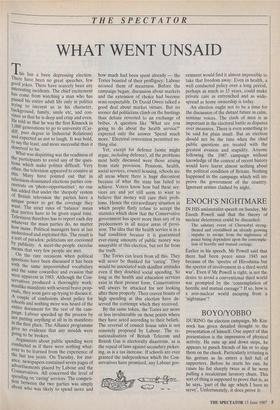THE SPECTATOR
WHAT WENT UNSAID
good jokes. There have scarcely been any Interesting incidents. The chief excitement has come from watching a man who has Passed his entire adult life only in politics trying to interest us in his character, background, family, smile etc, and con-
vince us that he is deep and crisp and even. He told us that he was the first Kinnock in 1,000 generations to go to university (Car- diff, pass degree in Industrial Relations) and expected us not to laugh. It was bold, to say the least, and more successful than it deserved to be.
What was dispiriting was the readiness of the participants to avoid any of the ques- tions which make politics difficult. Very Often, the television appeared to connive at this. Many have pointed out that in television-dominated elections parties con- centrate on `photo-opportunities'; no one has added that under the `duopoly' system ofBritish television the parties have a unique power to get the coverage they want. The strict rules of 'balance' mean that parties have to be given equal time. Television therefore has to report each day whatever the main parties do, no matter how inane. Political managers have at last understood and exploited this. The result is a sort of paradox: politicians are cocooned by publicity. A meet-the-people exercise means that very few people are met.
On the rare occasions when political questions have been discussed it has been with the same impoverished vocabulary and the same cowardice and evasion that were apparent in 1983. Although the Con- servatives produced a thoroughly work- manlike manifesto with several brave prop- osals, they soon gave up trying to discuss it. A couple of confusions about policy for schools and nothing more was heard of the entire document for the rest of the cam- paign. Labour speeded up the process by not putting anything at all in its manifesto in the first place. The Alliance programme gave no evidence that any moulds were going to be broken.
Arguments about public spending were Conducted as if there were nothing what- ever to be learned from the experience of the last ten years. On Tuesday, for inst- ance, newspapers contained seven pages of advertisements placed by Labour and the Conservatives. All concerned the level of spending on 'caring' services. The competi- tion between the two parties was simply about who was likely to spend more and
how much had been spent already — the Tories boasted of their profligacy: Labour accused them of meanness. Before the campaign began, discussion about markets and the extension of choice had become semi-respectable. Dr David Owen talked a good deal about market virtues. But no sooner did politicians climb on the hustings than debate reverted to an exchange of bribes. A question like 'What are you going to do about the health service?' expected only the answer 'Spend much more.' Electoral convention permitted no- thing else.
Yet, except for defence (some might argue, including defence), all the problems most hotly discussed were ‘those arising from state provision. Pensions, health, social services, council housing, schools are all areas where there is huge discontent because of what the state has failed to achieve. Voters know how bad these ser- vices are and yet still seem to want to believe that money will cure their prob- lems. Hence the extraordinary situation in which people flatly refuse to accept the statistics which show that the Conservative government has spent more than any of its predecessors in all major areas of provi- sion. The idea that the health service is in a bad condition because it is guaranteed ever-rising amounts of public money was unsayable at this election, but not far from the truth.
The Tories can learn from all this. They will never be thanked for 'caring'. They would be associated with skinflint attitudes even if they doubled social spending. So long as the health and education services exist in their present form, Conservatives will always be attacked for not looking after them properly. Their craven boasts of high spending at this election have de- served the contempt which they received.
By the same token, the Tories are more or less invulnerable on those points where they have acted according to their beliefs. The reversal of council house sales is not remotely proposed by Labour. The re- nationalisation of British Telecom and British Gas is electorally disastrous, as is the repeal of laws against secondary picket- ing, as is a tax increase. If schools are ever granted the independence which the Con- servatives have promised, any Labour gov-
ernment would find it almost impossible to take that freedom away. Even in health, a well conducted policy over a long period, perhaps as much as 15 years, could make private care as entrenched and as wide- spread as home ownership is today.
An election ought not to be a time for the discussion of the distant future in calm, seminar voices. The clash of men is as important in the electoral battle as disputes over measures. There is even something to be said for plain insult. But an election should not be the time when the chief public questions are treated with the greatest evasion and stupidity. Anyone following the 1987 campaign without knowledge of the context of recent history would have learnt almost nothing about the political condition of Britain. Nothing happened in the campaign which will im- prove the government of the country. Ignorant armies clashed by night.



























































 Previous page
Previous page